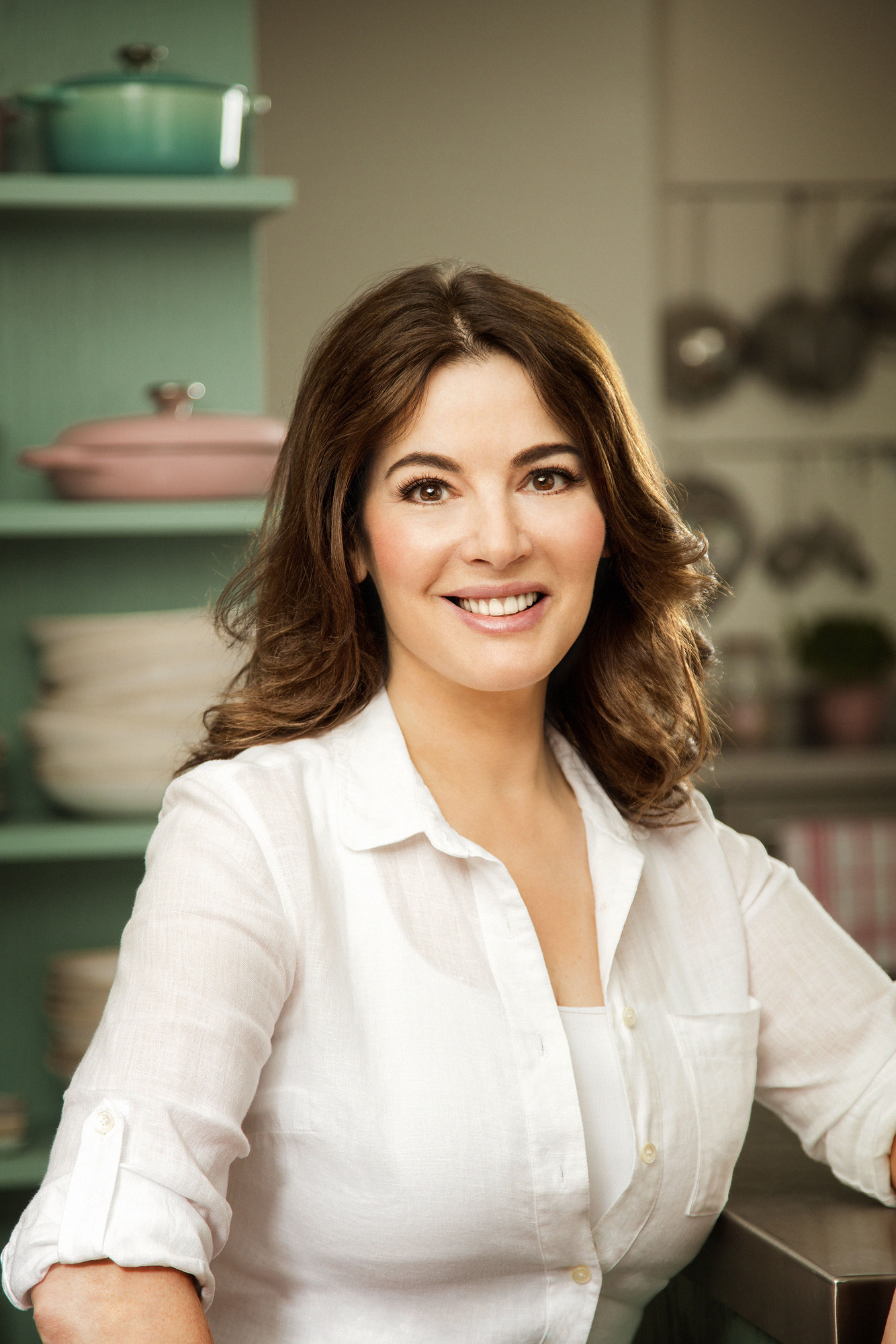Simply Nigella, BBC Two | reviews, news & interviews
Simply Nigella, BBC Two
Simply Nigella, BBC Two
The food is fresh, the concept stale

TV chefs are like the characters in a favourite band, each one with their newsworthy quirk. There’s the matey one, the posh one, the sweary one, the mumsy one, and the light-fingered one. Then there’s Nigella, the kittenish one, best known for licking her fingers with a lingering thoroughness rarely seen on family television. (She was once the Oxford graduate best known as deputy literary editor of The Sunday Times.
This series features the sort of quick but wholesome recipes that can be rustled together after a tiring day at the office. (Presumably Nigella has friends who can tell her what those are like.) And in fairness, the recipes look good: simple but flavoursome ingredients, and even simpler techniques involving much use of aforementioned fingers, both in the preparation and eating. The lamb ribs with cumin used a neglected ingredient in an imaginative way. It was difficult to be sure, given the copious soft-focus on her in-laws enjoying the result, but they looked delicious. These recipes are so simple Nigella runs the risk of not selling the books.
But recipes alone aren’t enough, these days. There are millions of them, available for free, courtesy of cyberspace, while reality TV, in the guise of Bake-Off and Masterchef, has also encroached into food broadcasting. The food media’s book-and-TV series formula, a gold mine since Delia Smith invented it in the 1980s, has been showing signs of drying up.
Hugh Fearnley-Whittingstall and Jamie Oliver have responded by becoming campaigners, for ecological food production and children’s health respectively, which gives their public profile extra interest. A cynic might observe that both have launched campaigns at the same time as Nigella launches this series: just in time for a Christmas marketing push. Nevertheless, both have good causes, sincerely held, and have forced worthwhile changes in their areas of policy.
 Nigella, meanwhile, carries on serenely as if it’s still 1995, her only concession to cash-strapped, time-poor millennials coming in these simpler recipes. There’s the fey, dated atmosphere of a Richard Curtis film about her programmes, as if her neighbours in the dappled Georgian squares of Marylebone and Notting Hill, where she strolls about doing her shopping, are winsome Hugh Grant lookalikes, rather than a Singaporean property-holding company and Russian oilmen.
Nigella, meanwhile, carries on serenely as if it’s still 1995, her only concession to cash-strapped, time-poor millennials coming in these simpler recipes. There’s the fey, dated atmosphere of a Richard Curtis film about her programmes, as if her neighbours in the dappled Georgian squares of Marylebone and Notting Hill, where she strolls about doing her shopping, are winsome Hugh Grant lookalikes, rather than a Singaporean property-holding company and Russian oilmen.
The scenes in which she bought her ingredients were in any case superfluous, the sense of affluent leisure attached to her programmes’ lifestyle hopelessly pre-crash. Which leaves Nigella’s core virtues. While it can be empirically established by anyone with an internet connection that there is simply no limit to the number of shapely busts the world would like to see, the camera spent so long lingering on a head-and-shoulders shot of Nigella, olive-oiled fingers, coquettish smile and bosom, filling half the screen, in pin-sharp focus, that it actually began to feel uncomfortable to watch.
Occasionally, Nigella’s articulacy punctures the fragrant simpering. While her descriptions of the food are sometimes overcooked, some of her language is beautiful. She could be a much more compelling and original prospect. You don’t catch Jamie Oliver calling his marinated onions “a beautiful lambent puce”.
The future of Arts Journalism
You can stop theartsdesk.com closing!
We urgently need financing to survive. Our fundraising drive has thus far raised £49,000 but we need to reach £100,000 or we will be forced to close. Please contribute here: https://gofund.me/c3f6033d
And if you can forward this information to anyone who might assist, we’d be grateful.

Subscribe to theartsdesk.com
Thank you for continuing to read our work on theartsdesk.com. For unlimited access to every article in its entirety, including our archive of more than 15,000 pieces, we're asking for £5 per month or £40 per year. We feel it's a very good deal, and hope you do too.
To take a subscription now simply click here.
And if you're looking for that extra gift for a friend or family member, why not treat them to a theartsdesk.com gift subscription?
more TV
 Murder Before Evensong, Acorn TV review - death comes to the picturesque village of Champton
The Rev Richard Coles's sleuthing cleric hits the screen
Murder Before Evensong, Acorn TV review - death comes to the picturesque village of Champton
The Rev Richard Coles's sleuthing cleric hits the screen
 Black Rabbit, Netflix review - grime and punishment in New York City
Jude Law and Jason Bateman tread the thin line between love and hate
Black Rabbit, Netflix review - grime and punishment in New York City
Jude Law and Jason Bateman tread the thin line between love and hate
 The Hack, ITV review - plodding anatomy of twin UK scandals
Jack Thorne's skill can't disguise the bagginess of his double-headed material
The Hack, ITV review - plodding anatomy of twin UK scandals
Jack Thorne's skill can't disguise the bagginess of his double-headed material
 Slow Horses, Series 5, Apple TV+ review - terror, trauma and impeccable comic timing
Jackson Lamb's band of MI5 misfits continues to fascinate and amuse
Slow Horses, Series 5, Apple TV+ review - terror, trauma and impeccable comic timing
Jackson Lamb's band of MI5 misfits continues to fascinate and amuse
 Coldwater, ITV1 review - horror and black comedy in the Highlands
Superb cast lights up David Ireland's cunning thriller
Coldwater, ITV1 review - horror and black comedy in the Highlands
Superb cast lights up David Ireland's cunning thriller
 Blu-ray: The Sweeney - Series One
Influential and entertaining 1970s police drama, handsomely restored
Blu-ray: The Sweeney - Series One
Influential and entertaining 1970s police drama, handsomely restored
 I Fought the Law, ITVX review - how an 800-year-old law was challenged and changed
Sheridan Smith's raw performance dominates ITV's new docudrama about injustice
I Fought the Law, ITVX review - how an 800-year-old law was challenged and changed
Sheridan Smith's raw performance dominates ITV's new docudrama about injustice
 The Paper, Sky Max review - a spinoff of the US Office worth waiting 20 years for
Perfectly judged recycling of the original's key elements, with a star turn at its heart
The Paper, Sky Max review - a spinoff of the US Office worth waiting 20 years for
Perfectly judged recycling of the original's key elements, with a star turn at its heart
 The Guest, BBC One review - be careful what you wish for
A terrific Eve Myles stars in addictive Welsh mystery
The Guest, BBC One review - be careful what you wish for
A terrific Eve Myles stars in addictive Welsh mystery
 theartsdesk Q&A: Suranne Jones on 'Hostage', power pants and politics
The star and producer talks about taking on the role of Prime Minister, wearing high heels and living in the public eye
theartsdesk Q&A: Suranne Jones on 'Hostage', power pants and politics
The star and producer talks about taking on the role of Prime Minister, wearing high heels and living in the public eye
 King & Conqueror, BBC One review - not many kicks in 1066
Turgid medieval drama leaves viewers in the dark
King & Conqueror, BBC One review - not many kicks in 1066
Turgid medieval drama leaves viewers in the dark
 Hostage, Netflix review - entente not-too-cordiale
Suranne Jones and Julie Delpy cross swords in confused political drama
Hostage, Netflix review - entente not-too-cordiale
Suranne Jones and Julie Delpy cross swords in confused political drama

Add comment